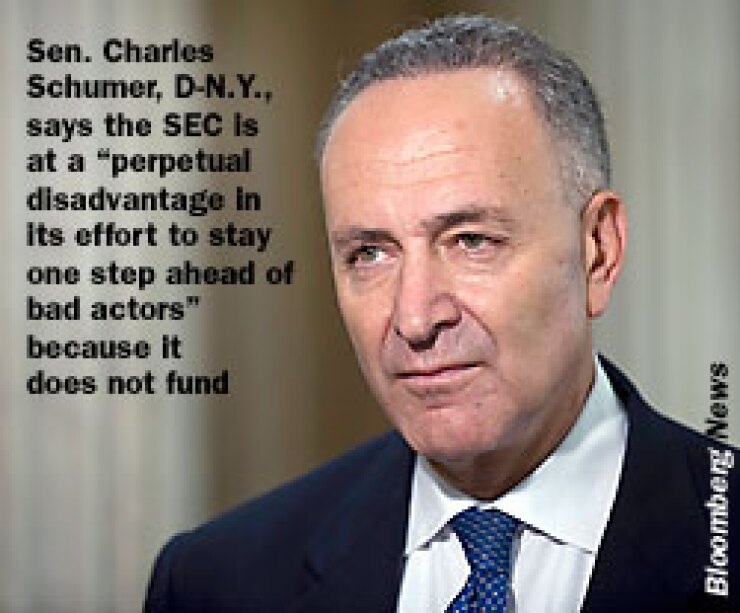
WASHINGTON — Sen. Charles Schumer joined current and former chairmen of the Securities and Exchange Commission yesterday to urge lawmakers to keep a self-funding provision for the SEC in financial regulatory reform legislation that is inching its way to a vote in the Senate.
The New York Democrat, who sits on the Senate Banking Committee, said in a call with reporters that self-funding for the SEC is “one of the top three or four things” that Congress can do to prevent a future financial crisis from occurring.
But he expressed concerned that the provision is not receiving enough attention and warned that some members of the Senate Appropriations Committee may seek to remove it from the legislation.
“I would hope to avoid a fight on this issue,” Schumer said, adding that the SEC is at a “perpetual disadvantage in its effort to stay one step ahead of bad actors” because it is one of only two federal financial regulators that does not fund itself.
The self-funding provision was included in a massive financial regulatory reform bill that cleared the Senate Banking Committee in a party-line, 13-to-10 vote last month. Schumer said the provision has support among some Republicans, but declined to identify them. The House passed a reform bill late last year without any such provision.
For the current fiscal year, which ends Sept. 30, the SEC is expected to receive $1.1 billion of appropriations.
That amount would be more than covered by the $1.5 billion in registration and transaction fees the agency is expected to receive from the entities it oversees, but those fees must be remitted to the Treasury Department.
SEC chairman Mary Schapiro, who participated in the call, said self-funding would ensure the commission’s independence, facilitate long-term planning, and close a resource gap between it and the entities it regulates.
“In the process, it allows the SEC to better protect millions of investors whose savings are at stake,” she said, adding that she sent letters to Senate Majority Leader Harry Reid, D-Nev., and Minority Leader Mitch McConnell, R-Ky., to amplify her point.
Schapiro said self-funding is so crucial to effective regulation that it’s considered the necessary financing model for new regulators like the Federal Housing Finance Agency and the proposed Consumer Financial Protection Agency.
Schapiro was joined on the call by five former heads of the SEC: David Ruder (1987-1989), Richard Breeden (1989-1993), Arthur Levitt (1993-2001), Harvey Pitt (2001-2003) and William Donaldson (2003-2005).
The former commissioners stressed that the provision would enhance the SEC’s independence, which Levitt said has been compromised in the past by lawmakers who threaten to cut the agency’s appropriations if it pursues controversial proposals their constituents do not support.
Schumer contends that, even without the power of the purse, Congress would still be able to maintain “rigorous” oversight over the SEC’s activities.
A spokesman for Daniel Inouye, D-Hawaii, Senate Appropriations Committee chairman, and Richard Durbin, D-Ill., the financial services panel chairman, said the two lawmakers are significantly concerned that any attempt to allow the SEC to set its own budget would be seen as an abdication of the constitutional responsibility of Congress.
They also doubt the wisdom of allowing the SEC to negotiate the fees of institutions it regulates. The spokesman said that the opportunities for congressional oversight would shrink for an agency exempted from the appropriations process.
Sen. Thad Cochran, R-Miss., the ranking minority member of the Appropriations Committee, said: “Before setting the SEC on a course to self-finance itself, the Congress should carefully consider what that would mean for decreasing congressional oversight of the agency’s activities and its budget.”
Cochran noted that Congress has increased the SEC’s budget.
“The Ponzi scandals and questionable financial dealings on Wall Street underscore the importance of giving the Securities and Exchange Commission sufficient resources and oversight to improve its regulation of the financial sector,” he said in a release. “The appropriations committees in the House and Senate have consistently provided increased funding for the SEC in recent years, while overseeing how the SEC uses these public funds.”





